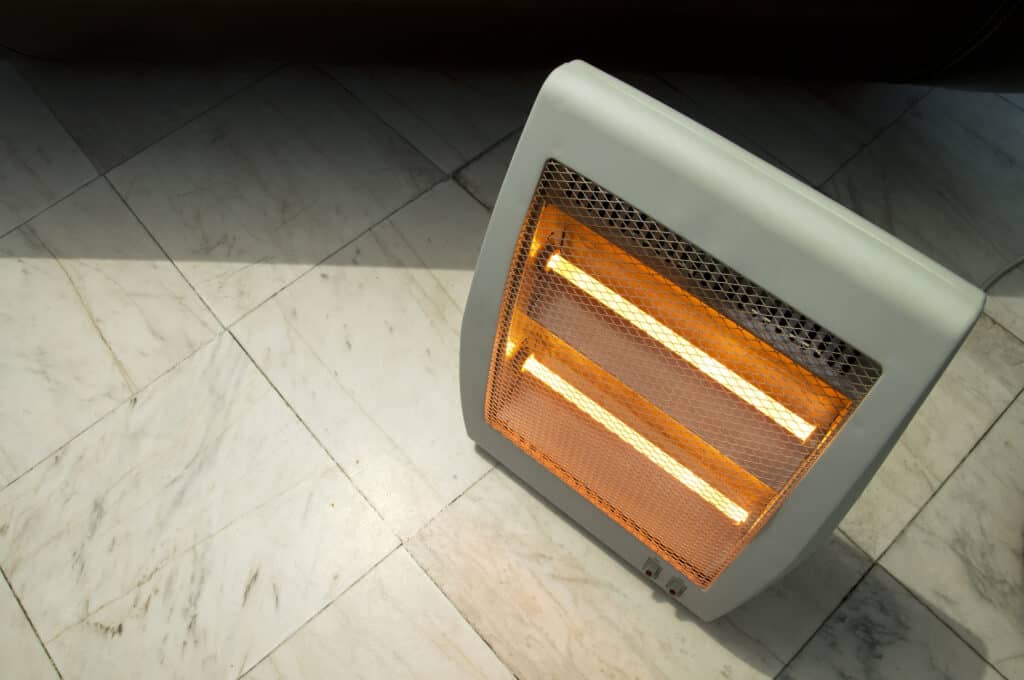What are the effects of electric heaters on humidity? Electric heaters can make the air feel dryer, but not remove the moisture.
This is because relative humidity, which is what you feel, and absolute humidity are two different things.
There are rumors that electric heaters dry out the air, making people hesitant to use them. But is this true?
To understand why electric heaters make the air feel drier, we need to understand the difference between relative humidity and absolute humidity.
Related Reading: The Truth About Electric Heaters and Carbon Monoxide Poisoning: Best Insight

Table of Contents
Effects of Electric Heaters on Humidity
During winter, you are more likely to turn on your electric heater or any other heat source when the cold air coming in from outside has low humidity levels.
This means that the air is already lacking in moisture before you even switch on your heater.
Cranking up the heat can make a room feel warmer, but it doesn’t add moisture.
In fact, adding heat to an already dry room causes any existing moisture to evaporate, leaving the room feeling even drier and you feeling dehydrated.
Electric heaters are not solely responsible for dry air.
The effects of electric heaters on humidity are low to none.
However, dry air remains a problem, but there are several easy solutions to rehydrate your environment.
Increase Moisture in the Air
Don’t suffer from dryness.
Here are some easy tips to add moisture to your environment:
- Seal your home: A well-insulated home can help you save money on heating and prevent cold, dry air from entering. To quickly seal any unwanted cracks and crevices in a draughty building, you can use affordable solutions such as caulk, spray foam, and weather stripping.
- Invest in a humidifier: Humidifiers add moisture to the air, replacing what is lost to evaporation. However, overusing a humidifier can create dampness, leading to mold and mildew growth.
- Wet Laundry: Air-drying your clothes in a heated room will increase the humidity and make the air feel less dry. Dry racks are easy to assemble and inexpensive. Air drying your clothes also saves on electricity.
- Bowls of Water: Placing bowls of water in different areas of your home is an inexpensive way to increase moisture levels. You can also add essential oils to make your house smell great. However, it’s important to note that bowls of water alone may not add a significant amount of moisture back into the air.
Adding moisture to your home can help reduce the dryness in the air when you turn on your electric heater during cold winter days.
This doesn’t have to be an expensive process.
However, even with increased moisture in the air, you may still experience dehydration, which can negatively affect your health.
Electric Heaters and Dry Skin
Electric heaters and other heat sources can cause dry skin, headaches, and parched nose and throat.
Adding moisture to your home is a good start, but it may not be sufficient.
Here are four easy tips for protecting your skin and body against dry air:
- Hydrate regularly: When moisture evaporates from your skin, the best way to replenish it is by drinking more water. This not only prevents your skin from drying out but also hydrates your body, preventing unpleasant symptoms such as fatigue and dehydration headaches.
- Moisturize: Applying the right moisturizer will lock moisture into your skin’s surface and prevent the discomfort of cracking and flaking. Everyone’s skin is different so finding a skincare routine that suits you might require a small amount of research, but skincare gurus like Hyram can guide you with fantastic tips and tutorials available for free on YouTube.
- Take shorter showers: There is nothing more tempting than a long hot shower on a chilly winter morning but, unfortunately, the steam and hot water can seriously dry out your skin. Shortening your shower time, reducing the water temperature, and moisturizing as soon as you get out are all smart simple ways of lessening the dehydrating effects of your shower.
- Switch off your heater at night: According to the India Times, sleeping with your heating on not only dries out your skin, but can also cause conjunctivitis, and allergies. Instead of cranking up the heat at bedtime, you might try using a warmer duvet, hot water bottle, or electric blanket as a safer and less dehydrating alternative.
Do Electric Heaters Remove Humidity?
If your home has excessive humidity, you might be wondering if an electric heater can help solve this problem.
This is the opposite of what was discussed earlier in the article.
Like with any other heat source, electric heaters will make the air feel drier, but as stated previously, electric heaters do not dry the air from a scientific perspective.
When you use an electric heater or any other heat source to warm up a room that has high levels of humidity, the heat will cause the moisture to rise from the ground and evaporate from your skin.
This will make the room feel less damp and humid.
However, if there is not enough ventilation, heating your room will not remove the moisture and it won’t solve problems related to dampness or mildew.
How to dehumidify the air in your room:
- Use a dehumidifier: Dehumidifiers work by drawing air from a room and cooling the moisture until it condenses into small water droplets which are collected in an inbuilt container. Dehumidifiers reduce humidity and can prevent dampness and mildew from setting in. Note: If you overuse a dehumidifier it will cause the air to dry out completely.
- Ventilate: By installing air vents or opening windows and doors to allow moist air to escape you will significantly reduce the levels of moisture in your home. This should work particularly well in conjunction with your electric heater but it’s worth noting that, although this will reduce the risk of dampness, the loss of heat through open windows and doors does not make it the most cost-effective solution.
- Say goodbye to your houseplants: If you live in a poorly ventilated home with high levels of humidity, then houseplants are not your friend. Plants emit moisture into the air which inevitably increases the humidity. If you love your houseplants and don’t want to say goodbye, placing them by an open window or swapping them for dessert succulents like cacti might be your best option.
Understanding Humidity
The effects of electric heaters on humidity are just a feeling and not actual.
When buying an electric heater, it’s crucial to take into account the humidity level in your surroundings.
You should also consider what measures you’re willing to take to regulate the moisture level in the air to your preference, in addition to heating.
Relative Humidity
Relative humidity is the ratio of the partial pressure of water vapor to the saturated vapor pressure of water at a given temperature (relative to temperature).
This is the amount of water vapor and air compared to the maximum amount of water vapor the air can hold at a certain temperature without condensing into liquid water.
The relative humidity is stated in percent.
Clouds form when air reaches its limit for holding water, causing precipitation.
Relative humidity is the amount of moisture present in the air.
Hot air can hold more water vapor than cold air, which is why colder regions tend to have less dry air.
For instance, the cold and damp areas of the US have more moisture in the air compared to the hot and dry regions.
Absolute Humidity
There will be no effects of electric heaters on humidity when it comes to absolute humidity.
Absolute humidity measures the amount of moisture in the air regardless of the temperature.
This measurement is done by finding the grams of total water vapor per cubic meter.
Why the Air Feels Dry with Electic Heaters
Although the effects of electric heaters on humidity are minimal, why does the air feel dry?
- Electric heaters warm up the air.
- Hot air carries more water vapor than cold air
- Because the hot air decreases the relative humidity, it makes the air feel drier but doesn’t change the amount of water in the room overall.
- Therefore, people think it’s drying the air out when in reality, it’s not.
Effects of Too-Low Humidity
People may worry about ‘dry air’ due to relative humidity, not actual water content.
In short, if the relative humidity drops below 30%, we may experience negative effects.
- Chapped lips
- Coughing/aggravating lung conditions like asthma, bronchitis, sinusitis, and those prone to nosebleeds
- Itchy or flaky skin
- Dry eyes
- Sore throats
- Colds or other illnesses
When the humidity level is low, it can cause your mucous membranes to dry out, particularly in your nose.
This can weaken your body’s natural defense mechanisms, making it easier for you to catch colds and other illnesses.
Humidity may be the reason why some people were told they would catch a cold in winter, as warm air carries water vapor more easily than cold air.
Excessively dry air can harm your health and damage your home and belongings.
This might include:
- Wooden furniture or wooden floorboards cracking
- Electronics getting damaged by static shock
- Paint chipping
- Wallpaper splitting
Although an electric heater doesn’t reduce absolute humidity, it can still cause relative humidity to become problematic.
Related Reading: Patio Heater Overnight: Is It Safe to Leave Them On?
How to Increase Relative Humidity
During winter months, if you’re concerned about relative humidity, there are a few things you can do, especially if you’re using an electric heater.
Some common recommendations:
- Buy a humidifier – these little gadgets add filtered water to the air as a fine mist. It can both help with your dry skin and eyes, but also adds a few small degrees in temperature
- Use containers of water – place containers of water around for natural evaporation. (You could even add a little essential oil for a nice scent around your home)
- Buy an aquarium – looks pretty, but most of them are also heated and therefore will evaporate and add a little moisture to whatever room it’s in
Reducing the Effects of Relative Humidity
If you are experiencing dry air and suffering from symptoms such as itchy skin, dry eyes, or a lung condition, there are a few things you can do to add moisture to the air.
In addition to the tips mentioned above, you can take some measures yourself to alleviate the problem.
- Consume hot liquids like soups, teas, or coffee.
- If you suffer from itchy skin, always keep a natural moisturizer on hand during the winter months. If it’s particularly itchy and painful, your doctor can prescribe some extra strong moisturizers.
Related Reading: Best Wall-Mounted Patio Heaters | Top Models Reviewed
Final Thoughts
In conclusion, electric heaters do not change the amount of water in the air, but they do make the air feel much drier.
If you are bothered by dry air, using humidifiers or natural sources of water to add moisture to the air can help alleviate the problem.
If you suffer from medical conditions caused by dry air, make sure to drink hot fluids and moisturize regularly.
In the end, there are no effects of electric heaters on humidity, but they do make the air feel warm and dry.
Enjoy living the outdoor life!!!

